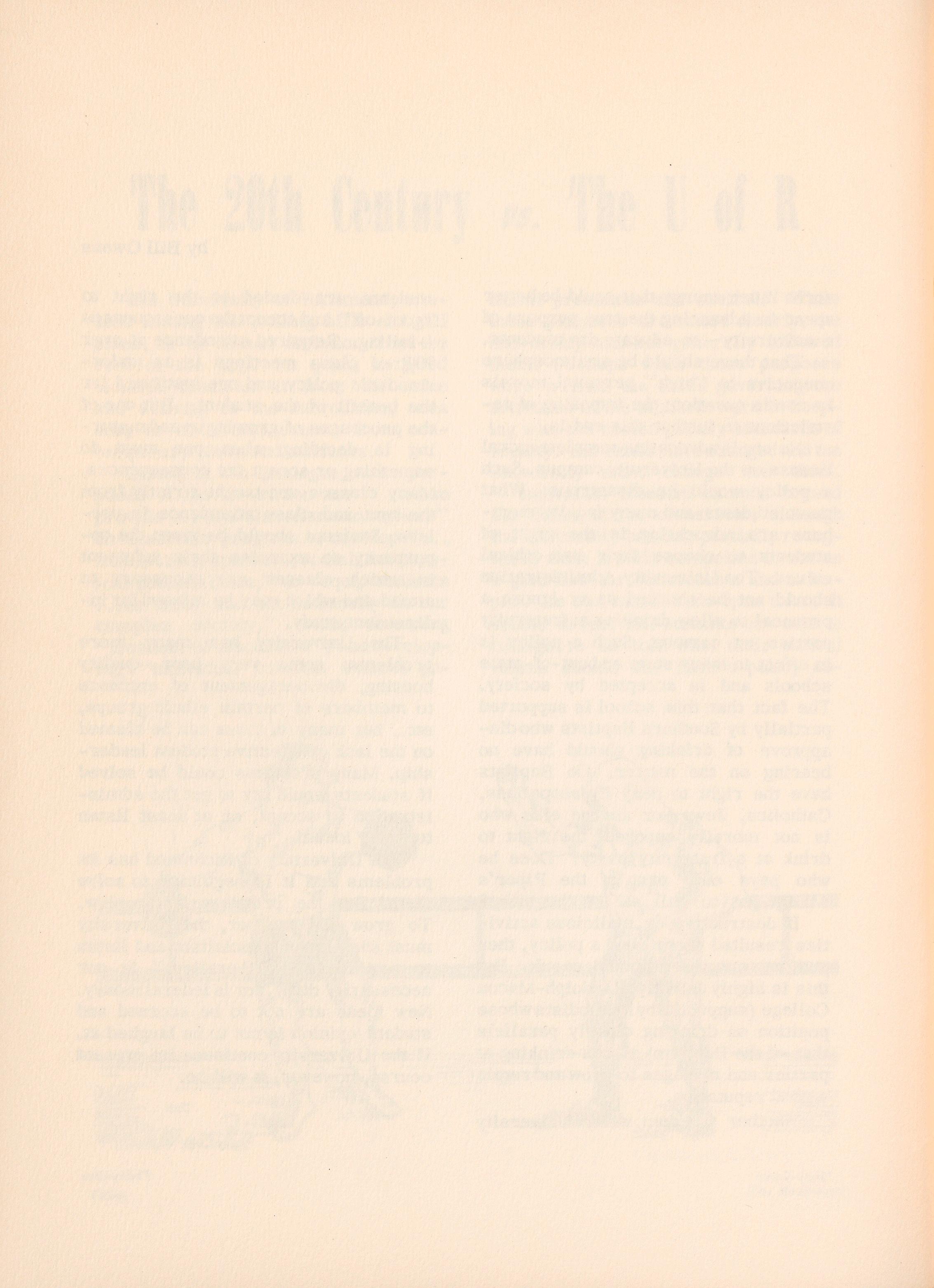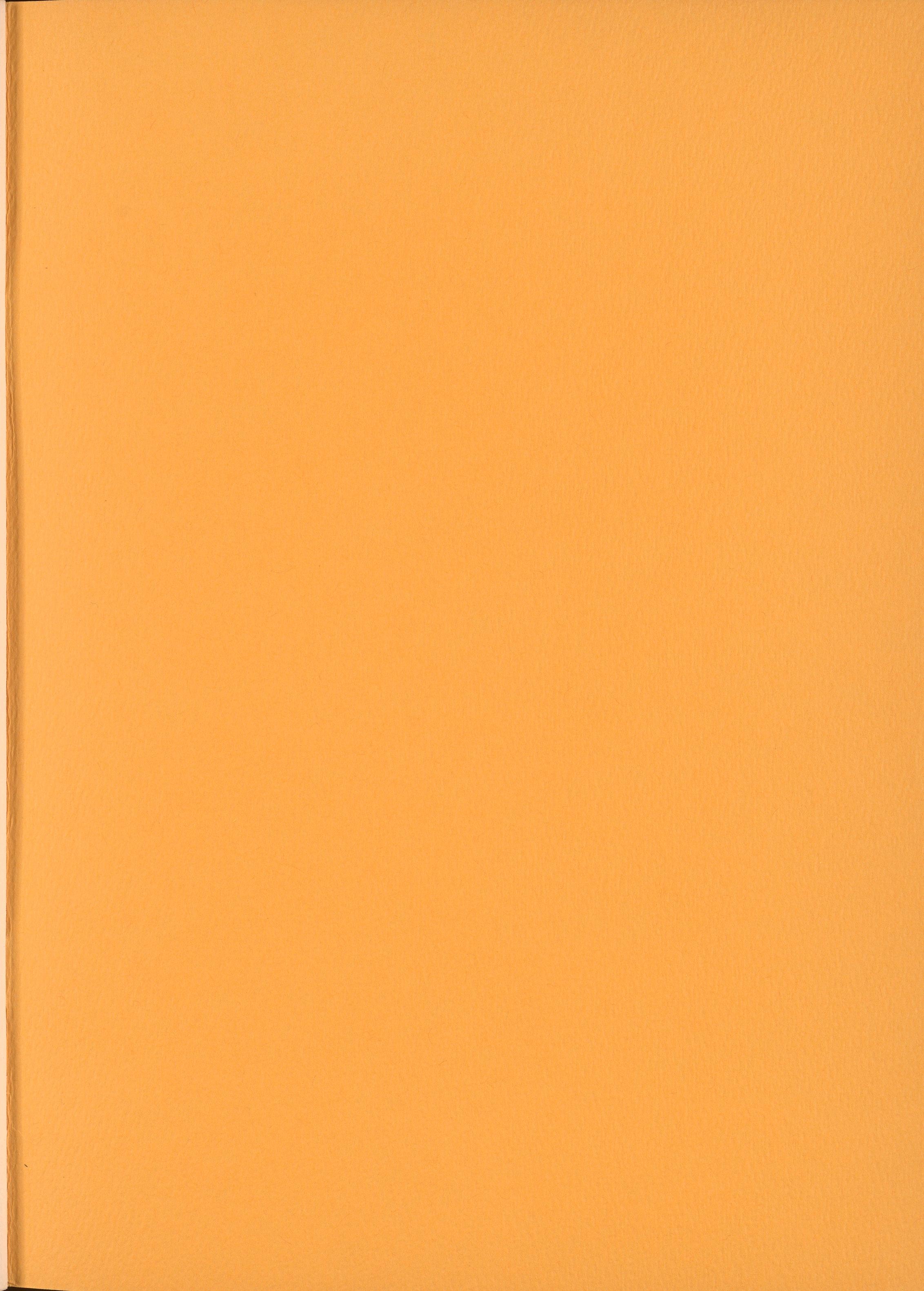THEMESSENGER
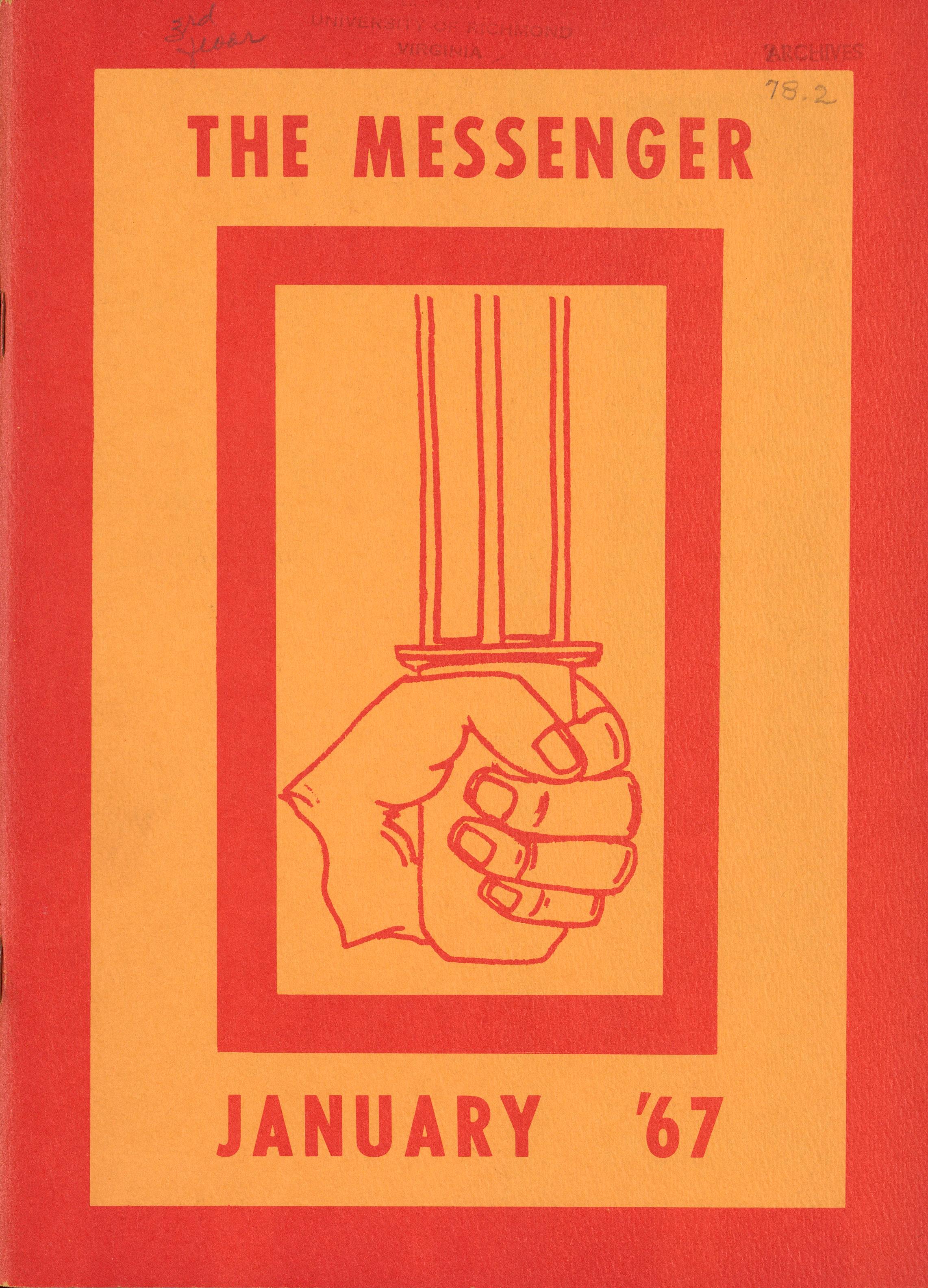
JANUARY'67



JANUARY'67


Vol. XCIII, No. 1
University of Richmond

EDITOR-IN-CHIEF
Dale Pa trick
ASSOCIATE EDITOR C. W. Bennett
BUSINESS MANAGER
Martha Dorman
LAYOUT EDITOR
Bill Owens
ART EDITOR
Craig English
PROSE EDITOR
Edwin J. C. Sobey
PROSE STAFF
John Helfrich
Shelley Abernathy
Lynn Robertson
POETRY EDITOR
James Bowen
. . . . Alan Markow
..... Dale Patrick
Dr. Robert S. Alley
.. Richard Goode
Gordon Converse
... Ed Sobey
C. W. Bennett
Nelson Cover
James Bowen
. Martha Dorman
Cathie Angle
Joan Bendall
Connie Moore
Kathleen Clinedinst
...... Bill Owens

CIRCULATION MANAGER
Cathie Angle
TYPISTS
Florence Tompkins
Jane Frazer
Vinnie Richards
Published three times annually by University of Richmond Publications , Incorporated Right is reserved to alter contributions to meet publication req~irements. All communications should be addressed to THE MESSENGER, Box 42 , University of Richmond, Virginia
THE MESSENGER staff has chosen ''Controversy'' as the theme of its first issue of the 1966-67 term. While presenting a new size in the magazine, we have also tried to project an image of THE MESSENGER as a spokesman for the students on matters of concern in the University community.
Particularly correlated to our theme are the articles by Alan Markow, Bill Owens, and Dr. Robert S. Alley. With Dr. Alley's article, THE MESSENGER , hopes to initiate a practice of faculty as well as student participation in the magazine.
The cover, which is also designed to complement our theme, is symbolic of the potential force of the written word.
We have attempted to select material for our magazine which will provoke thought, invoke questions, and cause heads to be shaken out of com-
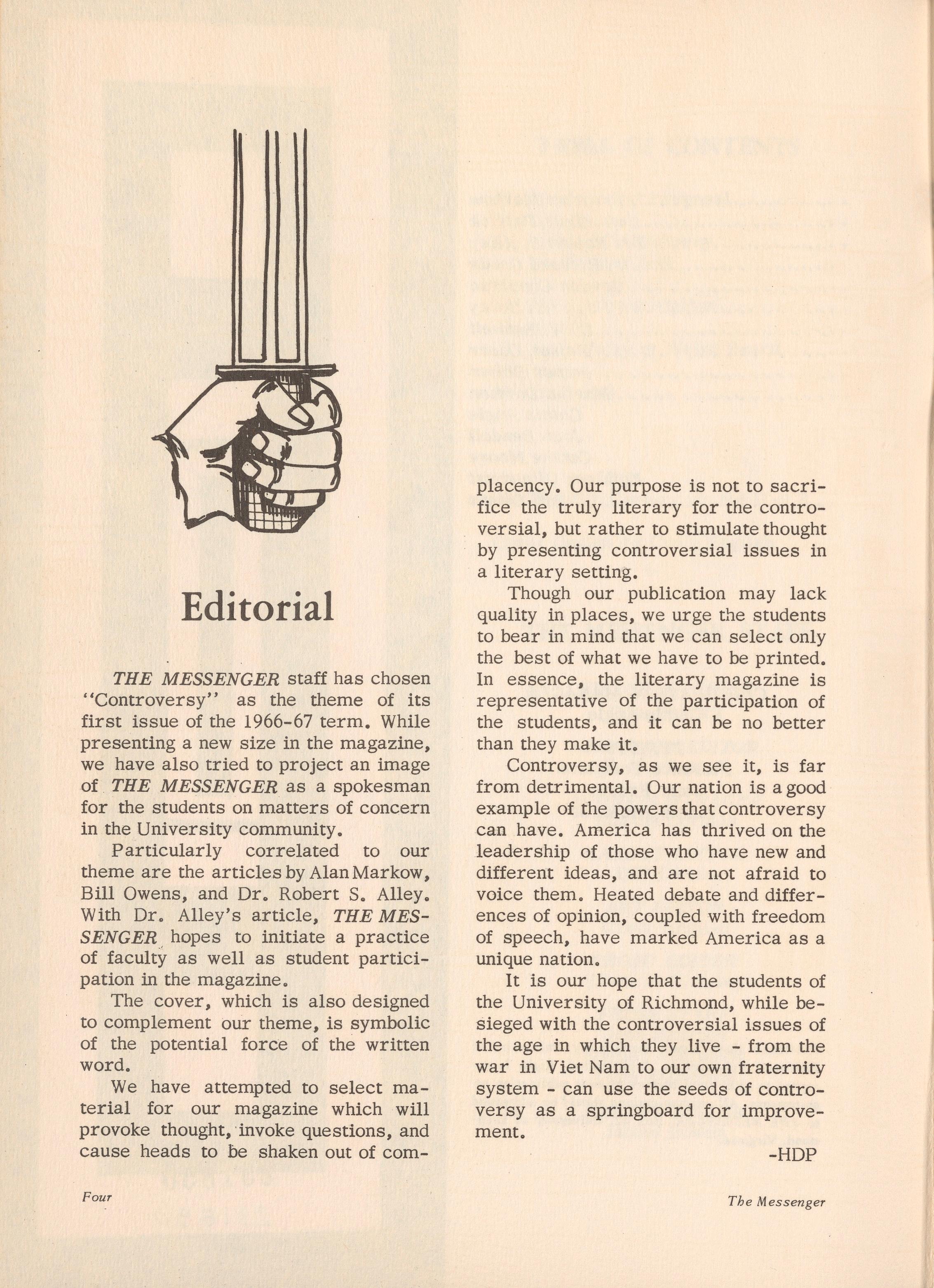
placency. Our purpose is not to sacrifice the truly literary for the controversial, but rather to stimulate thought by presenting controversial issues in a literary setting.
Though our publication may lack quality in places, we urge the students to bear in mind that we can select only the best of what we have to be printed. In essence, the literary magazine is representative of the participation of the students, and it can be no better than they make it.
Controversy, as we see it, is far from detrimental. Our nation is a good example of the powers that controversy can have. America has thrived on the leadership of those who have new and different ideas, and are not afraid to voice them. Heated debate and differences of opinion, coupled with freedom of speech, have marked America as a unique nation.
It is our hope that the students of the University of Richmond, while besieged with the controversial issues of the age in which they live - from the war in Viet Nam to our own fraternity system - can use the seeds of controversy as a springboard for improvement.
-HDP The Messenger
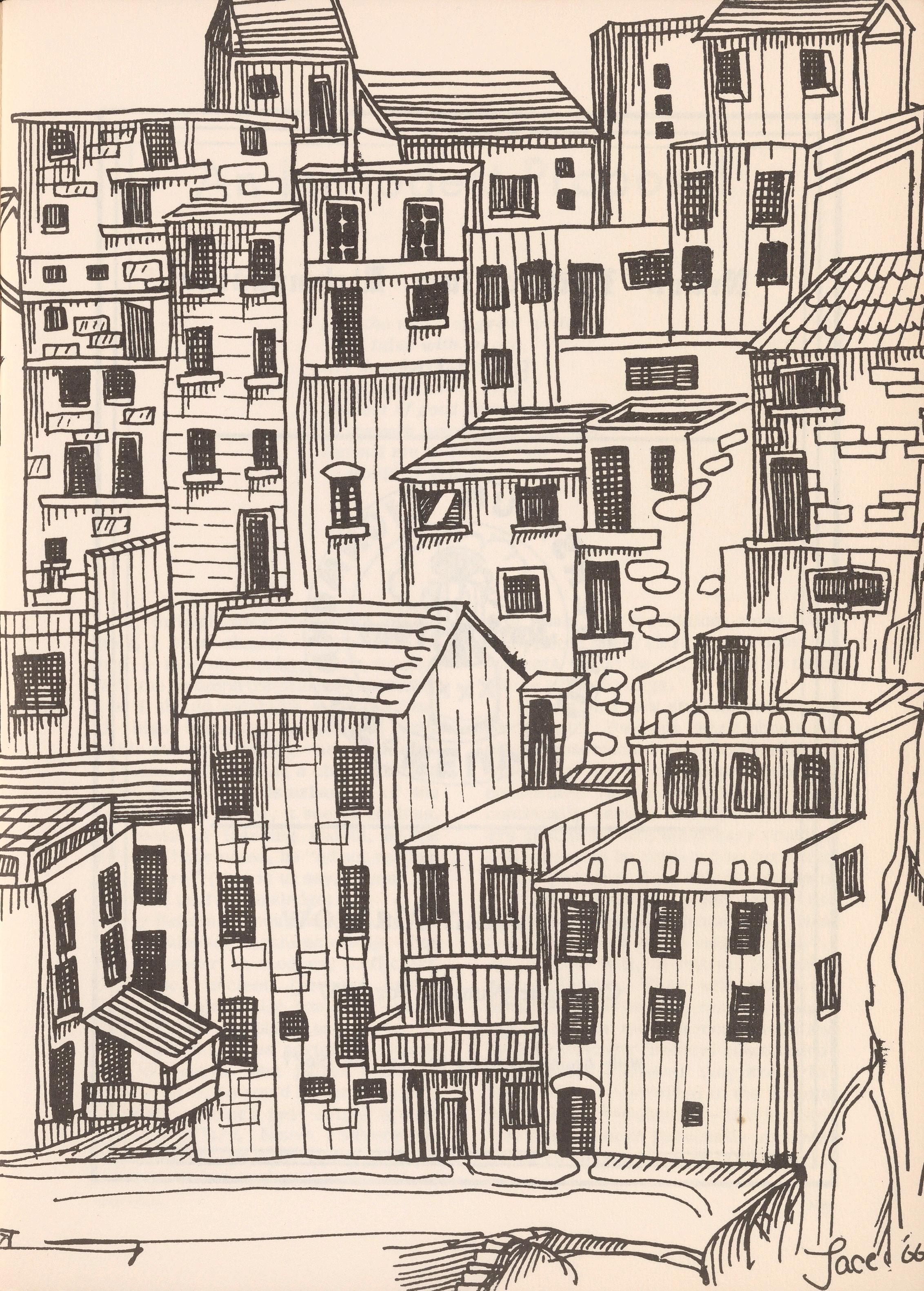

. President: Alan Markow
Catalogue Number For 1967
With Announcements For Session 1967?
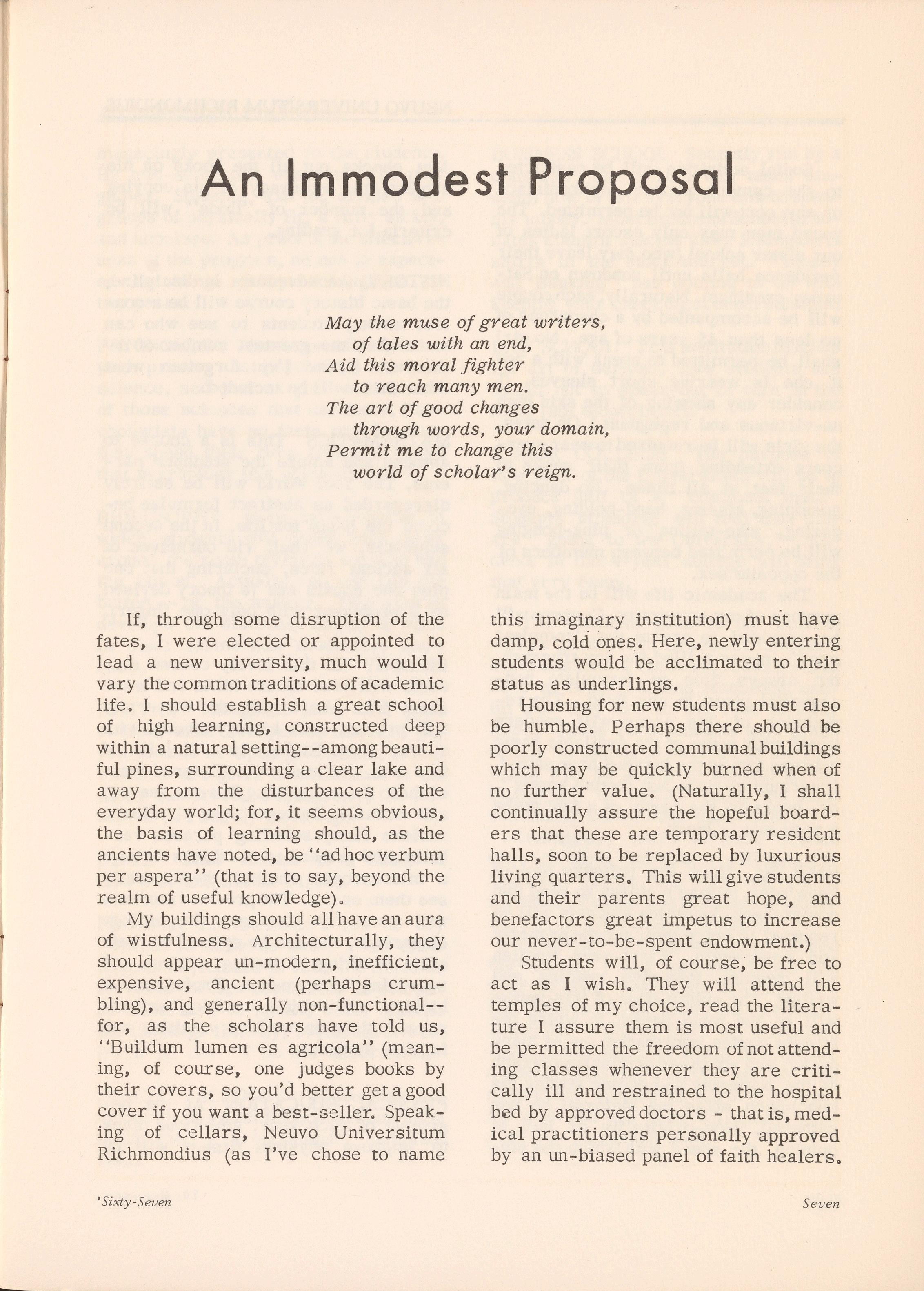
May the muse of great writers, of tales with an end, Aid this moral fighter to reach many men. The art of good changes through words, your domain, Permit me to change this world of scholar's reign.
If, through some disruption of the fates, I were elected or appointed to lead a new university, much would I vary the common traditions of academic life. I should establish a great school of high learning, constructed deep within a natural setting--amongbeautiful pines, surrounding a clear lake and away from the disturbances of the everyday world; for, it seems obvious, the basis of learning should, as the ancients have noted, be "ad hoc verbum per aspera" (that is to say, beyond the realm of useful knowledge).
My buildings should all have an aura of wistfulness. Architecturally, they should appear un-modern, inefficieut, expensive, ancient (perhaps crumbling), and generally non-functional-for, as the scholars have told us, "Buildum lumen es agricola" (meaning, of course, one judges books by their covers, so you'd better get a good cover if you want a best-seller. Speaking of cellars, Neuvo Universitum Richmondius (as I've chose to name
' Sixty -Seven
this imaginary institution) must have damp, cold ones. Here, newly entering students would be acclimated to their status as underlings.
Housing for new students must also be humble. Perhaps there should be poorly constructed communal buildings which may be quickly burned when of no further value. (Naturally, I shall continually assure the hopeful boarders that these are temporary resident halls, soon to be replaced by luxurious living quarters. This will give students and their parents great hope, and benefactors great impetus to increase our never-to-be-spent endowment.)
Students will, of course; be free to act as I wish. They will attend the temples of my choice, read the literature I assure them is most useful and be permitted the freedom of not attending classes whenever they are critically ill and restrained to the hospital bed by approved doctors -that is, medical practitioners personally approved by an un-biased panel of faith healers.
Social activities will be restricted to the campus proper. Aphrodisiacs of any sort will not be permitted. The young men may oi;i.ly escort ladies of our sister school (who may leave their residence halls until sundown on Saturday evenings). Naturally, each couple will be accompanied by a chaperone of no less than 45 years of age. No girl shall be permitted to speak with a boy if she is wearing short sleeves. (I consider any showing of the skin both un-virtuous and repugnant.) On dates, the girls will be required to wear overcoats extending from their necks to · their feet at all times. No dancing, gossiping, kissing, hand-holding, eyegazing, joke-telling or ping-ponging will ~e permitted between members of the opposite sex.
The academic life will be the main purpose of my university. Courses will be provided to create the ''compleat man" --never skilled for any true task, but always able to formulate nonessential plans in -any field. The remainder of this essay will concern itself with some of the available basic courses for, as the learned have stated, "learnum es vitae hoc dictum patria", or, books in the hands of a fool make a wise man .•••laugh.
ENGLISH Since the primary tool of knowledge is man's ability to read and comprehend, incoming students will be required to learn their tongue properly and completely. First-year English will require intensive reading and writing. The culmination of this course will be the term paper, in which the student copies information out of many books, and writes an original paragraph at the beginning and ending stating his conclusion about the material he has gathered. Non-originality or lack of opinion, the speed with which the stu-
Eight

NEUVO UNIVERSITUM RICHMONDIUS
dent checks out all the books on his subject, the accuracy of his copying and the number of "ibids" will be criteria for grading.
HISTORY An adventure in discipline, the basic history course will be a contest among students to see who can remember the greatest number of irrelevant facts. I've forgotten what other facts will be included.
MATHEMATICS This is a course to astound and amaze the students' parents. The real world will be entirely disregarded as abstract formulae become the basis for life. In the second semester, we shall rid ourselves of all ancient rules, declaring that one plus one equals one (a theory devised by a professor with only one finger).
BIOLOGY In this lovely course students will take nature hikes and learn about life. As a gift, the university will present each biology student with a free frog. Biology is a division of fine arts, and students will spend most of their time sketching flowers, leaves, and animals. Students must also learn various funny-sounding phrases verbatim and pretend to see things through a microscope, whether they actually see them or not. The pre-med students will normally dominate the biology classroom, and can be spotted by their adept handling of cutting, poking, and squeezing instruments. Professors of biology will enjoy teaching embarrassed girls as well as vomiting and fainting students.
PHYSICAL EDUCATION At the beginning of each year, ambitious plans to improve physical fitness will be
The Messenger
menacingly presented to the students. By mid-semester, everyone will play games. Students will be divided into groups of physically fit, a littly sickly, and hopeless. As proof of the effectiveness of the program, no one is expected to change groups throughout the two years.
PSYCHOLOGY Students will spend a year proving that psychology is a real science, and just as good as the rest of those sciences that use facts. Psychologists have no facts only because they spend their time trying to prove that psychology is a science.
PHILOSOPHY Here is a course in __ which students will chase each other around the room trying to see who has the button. Actually, no one has the button or the answer. This course develops the students' ability to state in clear terms how much they don't know.
R.O.T.C. Though it is a very good course, after two years, they will pay you to take it. Upon graduation, ROTC students are given commissions in the Army Reserves. Fortunately, the Reserves are rarely called up.
BIBLE This course is a study of God's Constitutional Rights.
FOREIGN LANGUAGES How to say "ou est la salle de bain?" and other important phrases in case the students travel to foreign countries. It will not be necessary to speak, write or read the language fluently, but students must learn to say "I do not understand."
SPECIAL SCHOOLS These are for students who wish to become something other than a professional ' 'compleat man.''
' Sixt y - SeuP1?

BUSINESS SCHOOL Secretly run by a computer, this school will teach students how to tell everyone how to spend his money. Most Business School graduates commit suicide after losing their shirts in the stock market. ''Money and Banking" has nothing to do with keeping your checking account straight.
LAW SCHOOL This institution teaches the art of defense. Law students are taught not to speak out of turn in the Mute (not Moot) Court.
JUNIOR COLLEGE The purpose of this part of the Universitum will be to produce half of a ''compleat man.'' Students attending will fe~l that they are "going to the University." Students in the 4-year college will think that very funny.
The ultimate goal of the. student will be graduation. Graduation is called Commencement because graduates then have to begin learning something useful that they can do the rest of their lives. Those rare students with practically no ability to succeed in the real world will be asked to remain at the University to teach. Thus, we shall constantly sustain our usefulness:
Unhappily, there is little chance that my ideal university will ever be realized, for in this world of factual behavior, no one would consider studying the courses I have outlined. However, to those who have heeded my words, I ask that you never end your tireless search for the unimportant knowledge, the great non-essential. Whatever you do, don't let so-called wise men of the real world lull you into a life of salaries, cocktail parties, and new cars. Refuse to earn your way, fo,r God and the State will gladly support the "compleat man."
D D D

Rock on, little world. What's a war?
We've still got beer and sex and smoke and aspirin
To numb the brain-
To ease the pain-
To stop the rainTo keep us sa~e.
Don't sweat the small stuff. What's a war?
It's only dead people. They've been dying since Adam and EveNothing new thereWhy give a damn?
Just as long as it isn't youTrue?
Besides it's only a few-million. Just some boys of eighteen, nineteen, twenty-
They haven't lived muchSo more than likelyThey don't know They're missing muchAnd more than likely They aren't. They aren't missing Much more thanA chance: To hope To succeed To try To fail To care To live.
Just a few things that we've got That they haven't. Don't be disturbed. What's a war?
- Dale Patrick

Since coming to the University of Richmond in 1963 I have been struck by many things of an encouraging nature concerning the health of the student body. In most measurable ways Richmond and Westhampton collegians are similar to their counterparts in sister institutions in the state and nation. There is genuine academic interest and a seriousness related to the pursuit of knowledge. Caught up in a new era where infromation flows forth at such a staggering rate that it often becom es difficult to determine the limits of a liberal arts education from year to year, the modern student generation has proved adaptable. It is not my opinion that students of the l 960's are more intelligent than their predecessors at the University, but they certainly have assimilated a vast store of information extending far beyond the imagination of college inhabitants only a brief fifteen years ago. Education becomes more and more an adventure into which, ideally, student and professor thrust themselves together in the unhindered search for truth. And yet it may be at this very point that regression is evident in scholarly matters.
In my little mor~. than six years of teaching, two concepts have constantly been extra-curricular fare. Indeed, even the classroom has not been off-
'Sixt y -Seven
by Dr. Robert S. Alley
limits for consideration of these matters. One has been the crying need for better faculty-student relations and the other is the need for discussion of controversial topics. The invitation to write this article for THE MESSENGER obviously involves both items and I would like to have you consider what each may imply about you as students on this campus.
Controversy is a popular word on campus today. In fact, it is all too regularly a security word for the sophisticated student who wishes to be identified as intellectual or scholarly. Now there is nothing wrong with a desire to be so identified, but somehow the word has come to have a false ring to me. I remind you that controversy involves, of necessity, ideas and thought, if it is to be a legitimate activity on the college campus. My sons often enter into controversy over whether to brush their teeth. In fact, children seem sometimes to enter into such debate either to gain attention or because they are seeking to conform to patterns of behavior observed and found attractive. Certainly the scholarly community has no place for controversy motivated by either of these alternatives. However, I often feel uneasy with the
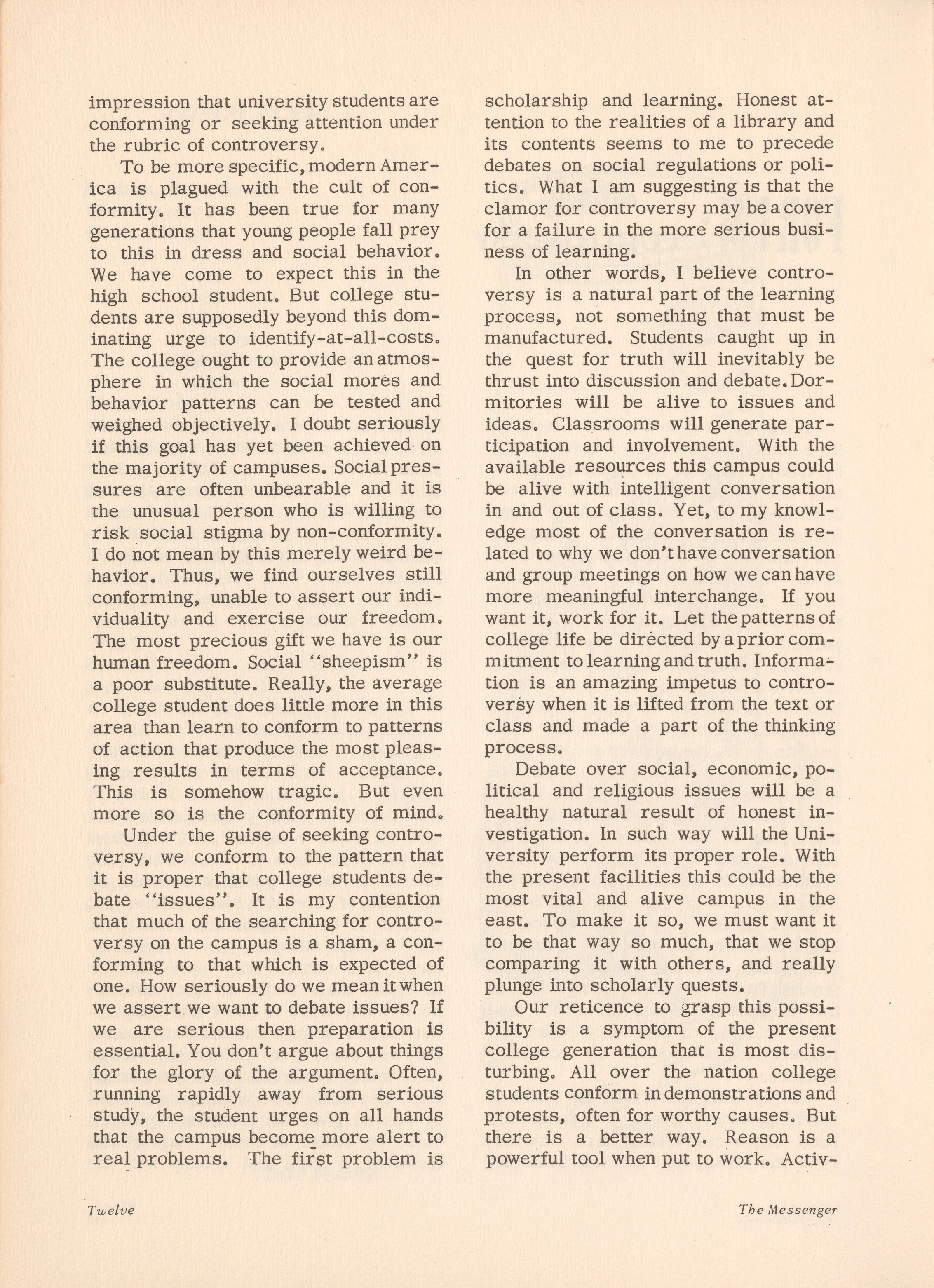
impression that university students are conforming or seeking attention under the rubric of controversy.
To be more specific, modern America is plagued with the cult of conformity. It has been true for many generations that young people fall prey to this in dress and social behavior. We have come to expect this in the high school student. But college students are supposedly beyond this dominating urge to identify-at-all-costs. The college ought to provide an atmosphere in which the social mores and behavior patterns can be tested and weighed objectively. I doubt seriously if this goal has yet been achieved · on the majority of campuses. Social pressures are often unbearable and it is the unusual person who is willing to risk social stigma by non-conformity. I do not mean by this merely weird behavior. Thus, we find ourselves still conforming, unable to assert our individuality and exercise our freedom. The most precious gift we have is our human freedom. Social "sheepism" is a poor substitute. Really, the average college student does little more in this area than learn to conform to patterns of action that produce the most pleasing results in terms of acceptance. This is somehow tragic. But even more so is the conformity of mind.
Under the guise of seeking controversy, we conform to the pattern that it is proper that college students debate ''issues". It is my contention that much of the searching for controversy on the campus is a sham, a conforming to that which is expected of one. How seriously do we mean it when we assert we want to debate issues? If we are serious then preparation is essential. You don't argue about things for the glory of the argument. Often, running rapidly away from serious study, the student urges on all hands that the campus become more alert to rea! problems. The first problem is
scholarship and learning. Honest attention to the realities of a library and its contents seems to me to precede debates on social regulations or politics. What I am suggesting is that the clamor for controversy may be a cover for a failure in the more serious business of learning.
In other words, I believe controversy is a natural part of the learning process, not something that must be manufactured. Students caught up in the quest for truth will inevitably be thrust into discussion and debate. Dormitories will be alive to issues and ideas. Classrooms will generate participation and involvement. With the available reso~ces this campus could be alive with intelligent conversation in and out of class. Yet, to my knowledge most of the conversation is related to why we don't have conversation and group meetings on how we can have more meaningful interchange. If you want it, work for it. Let the patterns of college life be directed by a prior commitment to learning and truth. Informa'tion is an amazing impetus to controversy when it is lifted from the text or class and made a part of the thinking process.
Debate over social, economic, political and religious issues will be a healthy natural result of honest investigation. In such way will the University perform its proper role. With the present facilities this could be the most vital and alive campus in the east. To make it so, we must want it to be that way so much, that we stop comparing it with others, and really plunge into scholarly quests.
Our reticence to grasp this possibility is a symptom of the present college generation that is most disturbing. All over the nation college students conform in demonstrations and protests, often for worthy causes. But there is a better way. Reason is a powerful tool when put to work. Activ-
ism often merely covers the failure of reason. I recommend a goal of scholarship and suggest the result will be reasoned discussion worthy of a college community.
II.
A related area is that of facultystudent relations. No one is more conscious of the desirability of good relationships between these two groups than I. It is an essential ingredient of the learning process that there be a genuine communication between faculty and students. An honest dialogue that demonstrates mutual respect within and outside the classroom is an essential part of an institution such as ours.
However, here again the problem is one of motivation. The good relations are not ends in themselves. You could have chummy meetings anywhere. The assumption behind the term ''faculty-student interchange," is that of mutual scholarly interest. It involves the common search for truth and is never to be allowed to degenerate into a personality cult. It should not be an effort to promote friendship. Quite clearly some students will find close attachment to one faculty member, others an attachment to another. This may lead to a very healthy social growth and development. It may at times provide an outlet for intellectual exchange. Yet, personal friendship must not become a substitute for a faculty-student encounter where the goal is understanding and truth. Such dialogue must involve students with faculty members they may notparticularly like. It must take the faculty member out of his habitual niche and drive him to encounter with students whom he seldom sees and with whom on the surface he has little in common. The uniting element is the search for truth and, if I may be permitted, ultimate reality.
'Sixty -Sev en

In such relationships new friendships will inevitably be formed. But this is not the goal. Here again, dialogue is a natural outgrowth of true scholarship in class and in study. Here both student and faculty are included. An exchange of views and ideas necessitates the acquaintance of the faculty with areas beyond their own fields. It will involve respect on the part of the faculty for the activities of the college and the community, as well as the various functions spon ·sored by the students.
In sum, this matter of relationships requires two ingredients. It quite naturally necessitates informed students with real purpose engaging the teacher in genuine conversation. This could be in class, in structured groups, or in personal encounter. And this is the point at which the second ingredient becomes significant. A healthy and significant relationship is possible only where there is mutual respect of ''personhood." If these two are present, faculty-student relations will be good. In recent months students have sought to generate real exchange on this level. This has been excellent , but it is only the first step. The student must have something in mind when he seeks this exchange or it will soon become a conforming activity necessary to create the right image. We must realize that we have the whole world to talk about and thus we move from the question how can we have interchange, to the more difficult realm :>fhaving it. It is more demanding because it places responsibility upon the participants who must cease the role of the sponge and actively be students. Faculty-student conversations are no substitute for the learning process, but they may well be the most meaningful fruition of that process.
D D D
Thirteen
by Richard Goode
She lay huddled beneath the wax light of another day, watching the shadowy candles flicker upon the flesh patterns of her longing, and while the syncopated breath of her lover's loving broke in tempo touched time against the darkening minutes of a dead dawn, her empty image became flesh filled with the sacrificial push of sensitivity, and through the rattling love bones of her body, she grasped the world, fragmenting moments into being.
Yet in the touch tangled minutes of love withered whispers, the violet hours of indecision crept close to the' masks of her feminine intimacy, and the uncertain light of tomorrow's coming hung silent within the doorways of her breathing.
Fourteen

Beneath the indecision of her hour, the day came dark frozen, and as the shadow mist curled cold upon the frosted windows of the sky, the beasts ravaged to remove the masks, gnawing their will into her thoughts.
Time, sensed with the heart beat of demon flesh, became scrawled upon the numeraled brain and while the minutes ached within the moment to be lived , the dog men raised a lustful leg toward the hillsides of appearance, forcing their acid longing upon the daisy dance of love, , and as her thoughts hung chained from the ghost breath of a thousand burned blossoms, her mind fell hollow into the next world.

The love pattern moves through my mind, Gently caressing my thought with soft music, Yet through the gossamer of warm smoke and Quiet breathing comes the wistful fl,utter Of yellow wings from the other side of ec·stasy. The moment's crimson reverie soon disappears, And slowly the blue cold of night falls darkly, And freezes silent within my mind.
Huddled in
The comer of my thoughts, a little girl begins To cry as the harsh city lights gash her face With distorted reflections.
And while a cat in Some lonely alley way opens its mouth to yawn, The small girl vanishes, leaving a tiny patch Of tear stained cement to be absorbed by the Silken dawn (thus ticks the unwinding spring within the idiot's numeraled brain).
In the
Expanded moment of naked memories, my hand Reaches to touch the shadows of a dead tree, And as my anxious fingers trace the cryptic Past into the ancient bark of turning thoughts, My mind gently sleeps in green leaves and sunlight.
But the shadows soon melt, spilling the forgotten Ashes of reality into my closed eyes: and I awake To the sound of soft crying. My heart gives a child's Tear for the shattered fragments of a broken doll Lying in my dreams.

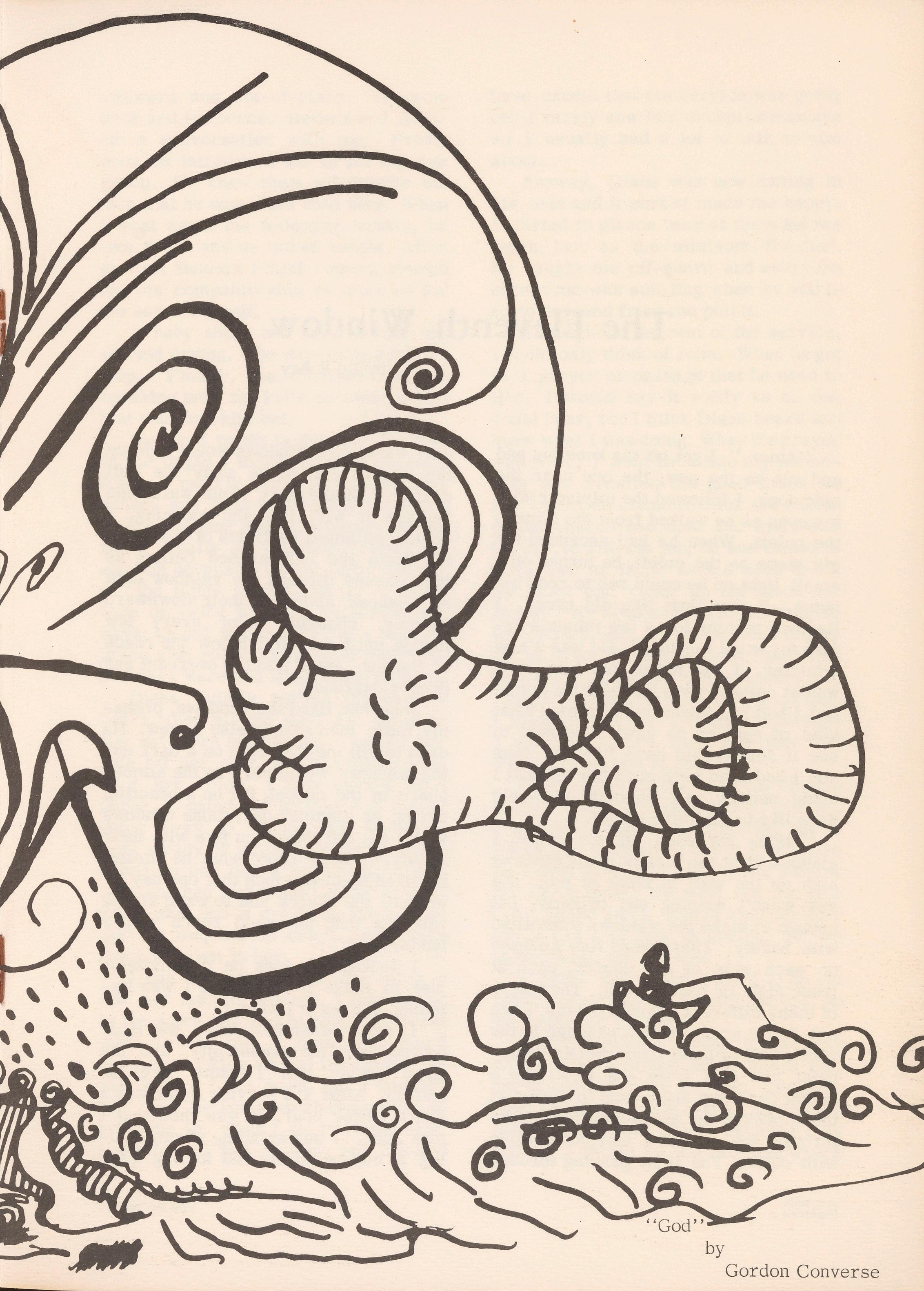
by Ed Sobey
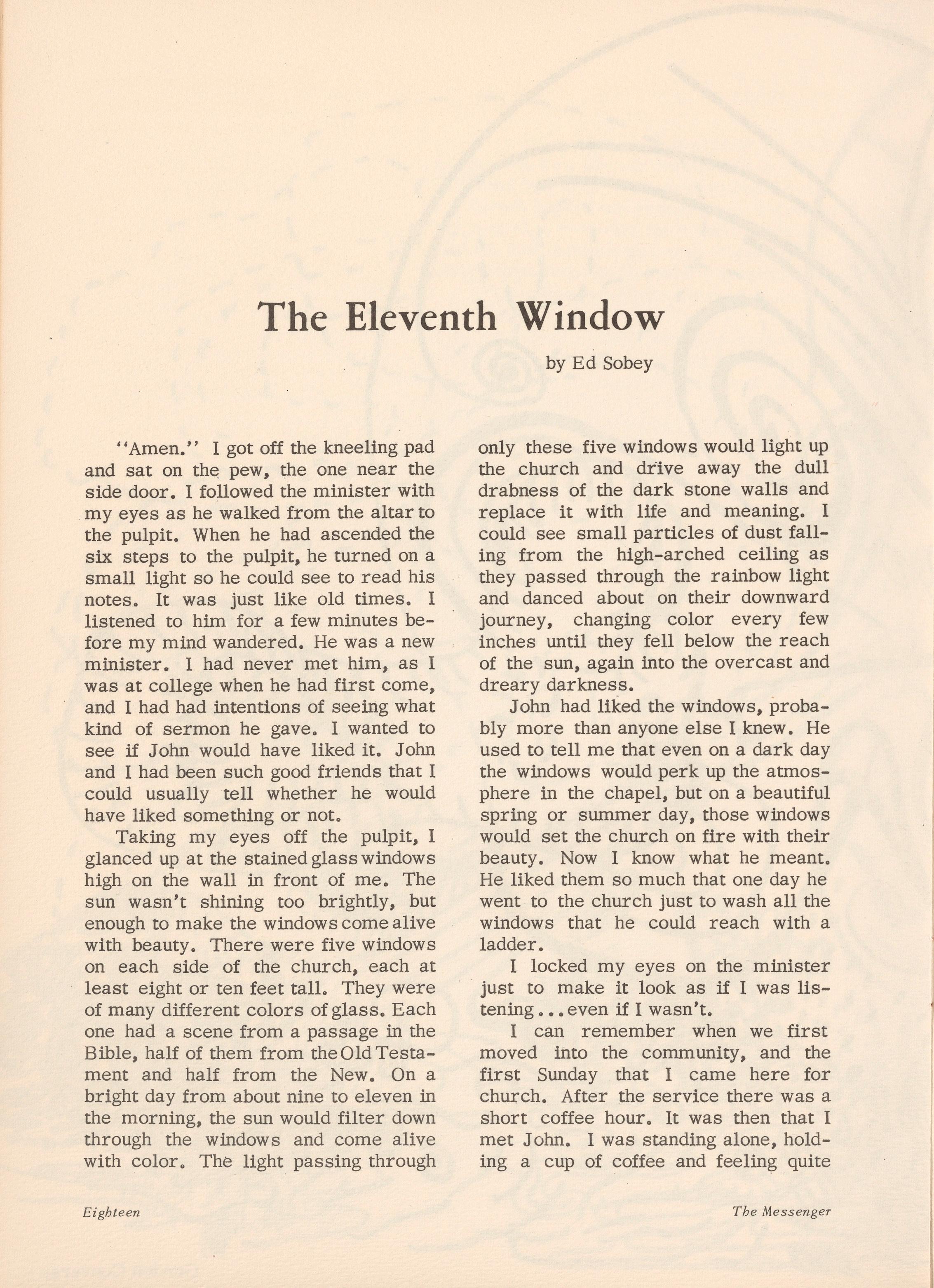
' 'Amen.'' I got off the kneeling pad and sat on th~ pew, the one near the side door. I followed the minister with my eyes as he walked from the altar to the pulpit. When he had ascended the six steps to the pulpit, he turned on a small light so he could see to read his notes. It was just like old times. I listened to him for a few minutes before my mind wandered. He was a new minister. I had never met him, as I was at college when he had first come, and I had had intentions of seeing what kind of sermon he gave. I wanted to see if John would have liked it. John and I had been such good friends that I could usually tell whether he would have liked something or not.
Taking my eyes off the pulpit, I glanced up at the stained glass windows high on the wall in front of me. The sun wasn't shining too brightly, but enough to make the windows come alive with beauty. There were five windows on each side of the church, each at least eight or ten feet tall. They were of many different colors of glass. Each one had a scene from a passage in the Bible, half of them from the Old Testament and half from the New. On a bright day from about nine to eleven in the morning, the sun would filter down through the windows and come alive with color. The light passing through Eighteen
only these five windows would light up the church and drive away the dull drabness of the dark stone walls and replace it with life and meaning. I could see small particles of dust falling from the high-arched ceiling as they passed through the rainbow light and danced about on their downward journey, changing color every few inches until they fell below the reach of the sun, again into the overcast and dreary darknes_s.
John had liked the windows, probably more than anyone else I knew. He used to tell me that even on a dark day the windows would perk up the atmosphere in the chapel, but on a beautiful spring or summer day, those windows would set the church on fire with their beauty. Now I know what he meant. He liked them so much that one day he went to the church just to wash all the windows that he could reach with a ladder.
I locked my eyes on the minister just to make it look as if I was listening ••• even if I wasn't.
I can remember when we first moved into the community, and the first Sunday that I came here for church. After the service there was a short coffee hour. It was then that I met John. I was standing alone, holding a cup of coffee and feeling quite
The Messenger
awkward and out-of-place. He came over and introduced himself and started a conversation with me. Pretty soon he introduced me to all my age group. He knew them all despite the fact that he was older than they. When I went again the following Sunday, he was there and we talked awhile. After several Sundays I think I went to church for his companionship as much as for _ · the service itself.
A baby about two rows behind me started crying. The darn thing wouldn't stop. Finally, the minister stopped speaking until the kid's parents got the hint and took him out.
We used to sit in the pews in front of the organ - those pews for the acolytes. I used to carry the cross every Sunday and John would either read the lesson or sing with the choir, but he and I usually sat together. During the sermon he was in charge of turning out all the lights in the church. I did it once or twice for him, but almost always he did it himself. He would sit in the side room off the altar where the switches were and listen to the sermon. Diane quietly opened the door a crack, then all the way, and came in and sat down next to me. I helped her take off her coat, and she thanked me in a low voice. I have always liked Diane. I dated her awhile just before going away to school, but we never went steady or anything. He had introduced us one day a couple of months ago; she had just moved in the area. I think she had a crush on John more than on me, but he didn't really take much interest in her.
I can remember that John came in one day late for church. I was sitting in the same pew I'm in now, and he sat down beside me. I remember that I had been looking around the church for him before I sat down, but I couldn't find him. He knelt down beside me when he came in. When I sat up in my seat, I wanted to talk to him, and I would
have except that the service was going on. I rarely saw him except on Sundays so I usually had a lot to talk to him about.
Anyway, Diane was now sitting in his seat and it sort of made me happy. I started to glance back at the windows again just as the minister finished. · He caught me off-guard and everyone except me was standing when he started to descend from the pulpit.
Throughout the rest of the service, I could only think of John. When he got to a prayer or passage that he used to like, I would say it softly so no one could hear, but I think Diane heard and : knew what I was doing. When the prayer was over, I went back into my memories and recalled the good times we had had. One summer after the sexton of the church had died and · there was no one to fill the job, he and I used to come two or three days a week to cut the lawn and clean up the place for Sunday. We always had fun workingfor the church, and we never took money for it. John told me several times that he wanted to become a missionary, and I think he would have made a good one. I used to think that I wanted to become a minister, but I know now that that was just because of John.
Soon the minister gave the closing prayer and everyone began to file out. I wanted to meet Dr. Thomas, but he was at the back door, and it looked like he would be surrounded by old biddies for some time. We went out the side door, Diane and I. It was kind of chilly for a day this late in spring, but we talked there for a while.
I asked her if she wanted to go eat lunch somewhere; she said she did, so we walked to my car.
The car wasn't much. It was only an old Chevy, about seven ·years old, but it did all right for me. My parents were always afraid of giving me their car, a new Buick, because they thought I would go too fast and wreck

'Sixty-Seven
Nineteen
the thing. We got it started fairly easily. I asked her where she wanted to go, but she said she didn't care. I picked a spot that wasn't too expensive and we had a quick lunch.
During the meal I talked about John for a few minutes, and she stopped eating momentarily. She looked at me and after a few seconds she asked if we might go out to see him. I was sort of glad she asked; I didn't know how to say it myself.
It was about a twenty minute drive. On the way we talked about old times. By the time we got there it was 2:30. I turned in at the gate and parked the car. There was no one else there. The sun had come out from behind the clouds, and it made the whole place seem very pretty. We walked back, trying not to step on any of the plots. I was facing the sun and it was hard to read but I could remember the exact words. On his grave were the remains of some flowers that someone had put there several weeks before. I knelt down and picked up the flowers and put them on the edge of the path. I had forgotten Diane, but she knelt beside me.
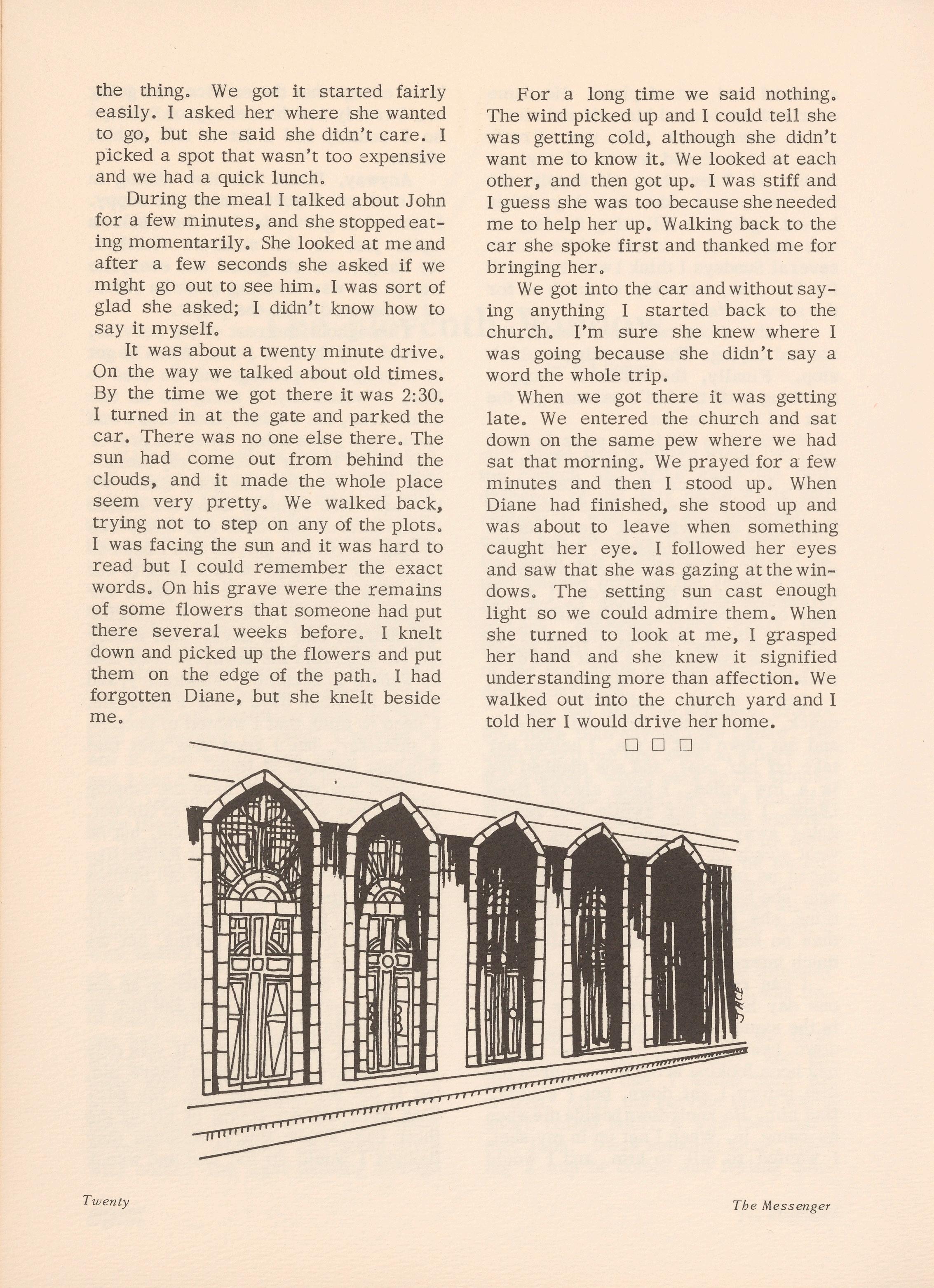
For a long time we said nothing. The wind picked up and I could tell she was getting cold, although she didn't want me to know it. We looked at each other, and then got up. I was stiff and I guess she was too because she needed me to help her up. Walking back to the car she spoke first and thanked me for bringing her.
We got into the car and without saying anything I started back to the church. I'm sure she knew where I was going because she didn't say a word the whole trip.
When we got there it was getting late. We entered the church and sat down on the same pew where we had sat that morning. We prayed for a few minutes and then I stood up. When Diane had finished, she stood up and was about to leave when som e thing caught her eye. I followed her eyes and saw that she was gazing at the windows. The setting sun cast enough light so we could admire them. When she turned to look at me, I grasped her hand and she knew it signified understanding more than affection. We walked out into the church yard and I told her I would drive her home. DD D
by C. W. Bennett
A black, fathomless, vacant sky Is a mirror of my soul.
All that I had Lies in the rotting pile of Disillusionment. All the bright, glittering promises Are shattered and mutilated By Experience. I stand and view A heap of broken glass, Substance of my dreams, A scattered, scattered gleam Of transparent Hope Covers the dying earth.
I am terrified To need; To need one now So Dear. Why do I fear To love? Is it because I dare not risk The crushing of a budding dream? Is it that the vapors Of this Dream Are yet so sweet If ear to lase them, too ?
Does my naked soul, Revealed, Make her know me Too well?
When the mysteries are all gone, Does the pricking, stinging Pain
Of rejection enter in, Filling the frigid, veiled vac uum? Am I alone In our intimacy ?
' Sixty -Seven
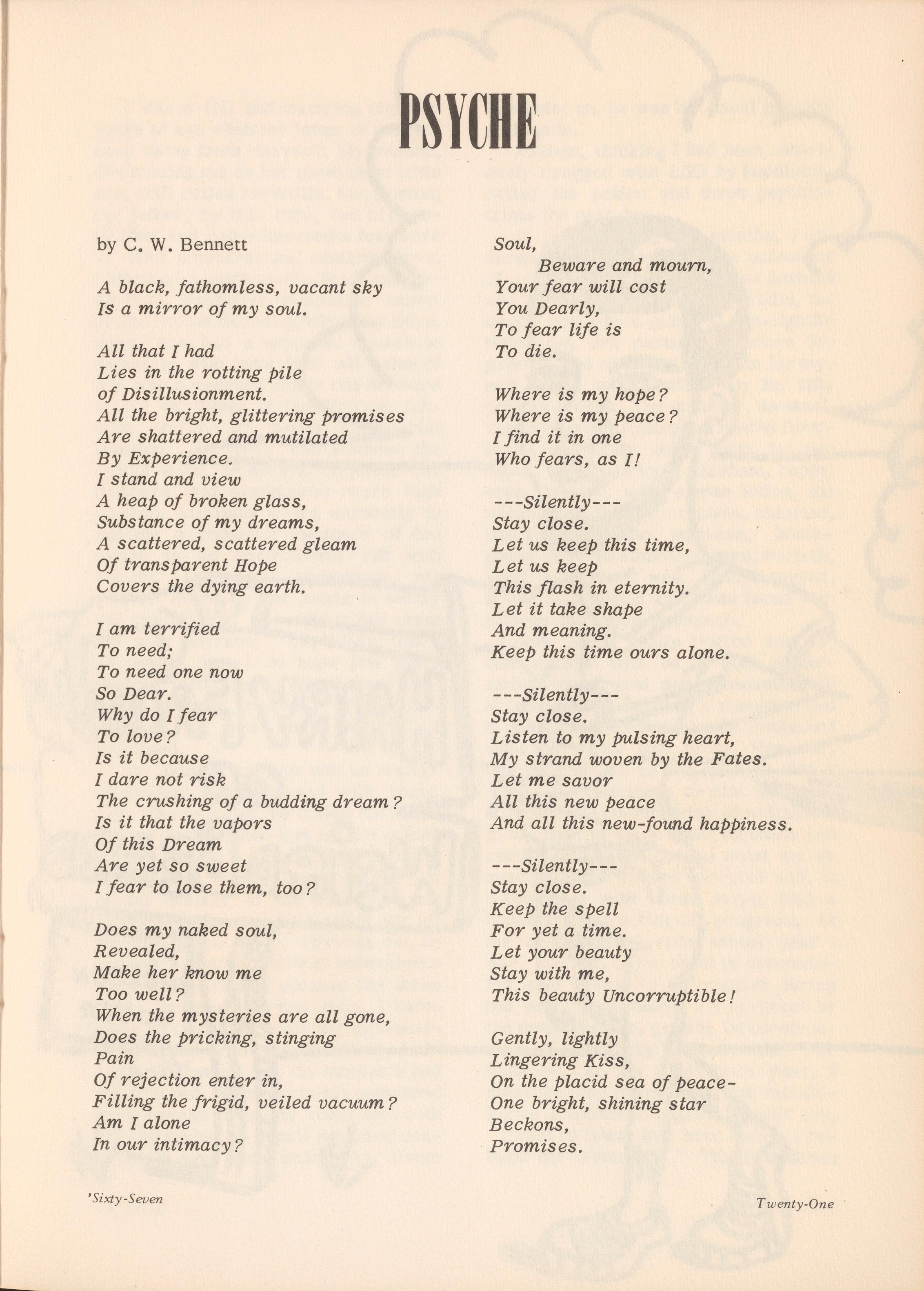
Soul, Beware and mourn, Your fear will cost You Dearly, To fear life is To die.
Where is my hope? Where is my peace? I find it in one Who fears, as I!
---Silently--Stay close. Let us keep this time, Let us keep This flash in eternity. Let it take shape And meaning. Keep this time ours alone.
---Silently--Stay close. Listen to my pulsing heart, My strand woven by the Fates. Let me savor All this new peace And all this new-found happiness.
- --Silently--Stay close. Keep the spell For yet a time. Let your beauty Stay with me, This beauty Uncorruptible !
Gently, lightly Lingering Kiss, On the placid sea of peaceOne bright, shining star Beckons, Promises.
-One

I was a full and maturing eighteen years of age when my letter of acceptance came from Harvard. My mother, envisioning me as her permanent little son, still called me Willie. Mr. Norton, my father, by this time, had his suspicions and had witnessed a few more or less embarrassing confirmations. I attended a gentlemanly, brick and ivycovered, exclusive institution known as the Holme Boarding School for Boys. Here, one had a supposed chance to associate with boys from all walks of life who possessed either one or more of the attributes of intelligence, athletic ability, or money and social position. The boys who attended the school were, as always, cliquish. The teachers and headmaster were high striving idealists trying earnestly to execute a romantic escapade of delusion in an environment rift with reality. Upon my acceptance, my mother threw up her hands in worry and pseudo-joy. She said in her usual flat sour soprano; "Oh, Willie, that's wonderful. But I do hope you won't become mixed up in any of those horrible beat-nik groups. ---Please,--promise me you won't, Willie." I promised.
My father was, to use an understatement, quite pleased with young Bill. The next day, he called the headmaster and thanked him for the splendid job, wrote a letter of gratitude to my faculty adviser, sent a fifth of Johnny Walker to the College Counselor, and threw a free lunch for all the boys at the office. Towards me, he became a beaming blob of benevolence and let me do as I pleased for three days. However, at that time, I came home so tipsy that while trying to navigate myself from the hall to my bedroom, I crawled into my mother's and father's bed. I then staunchly demanded their egress from my room and, with that, proceded to expell my inner contents all over their bedspread. From
•Sixty-Seven
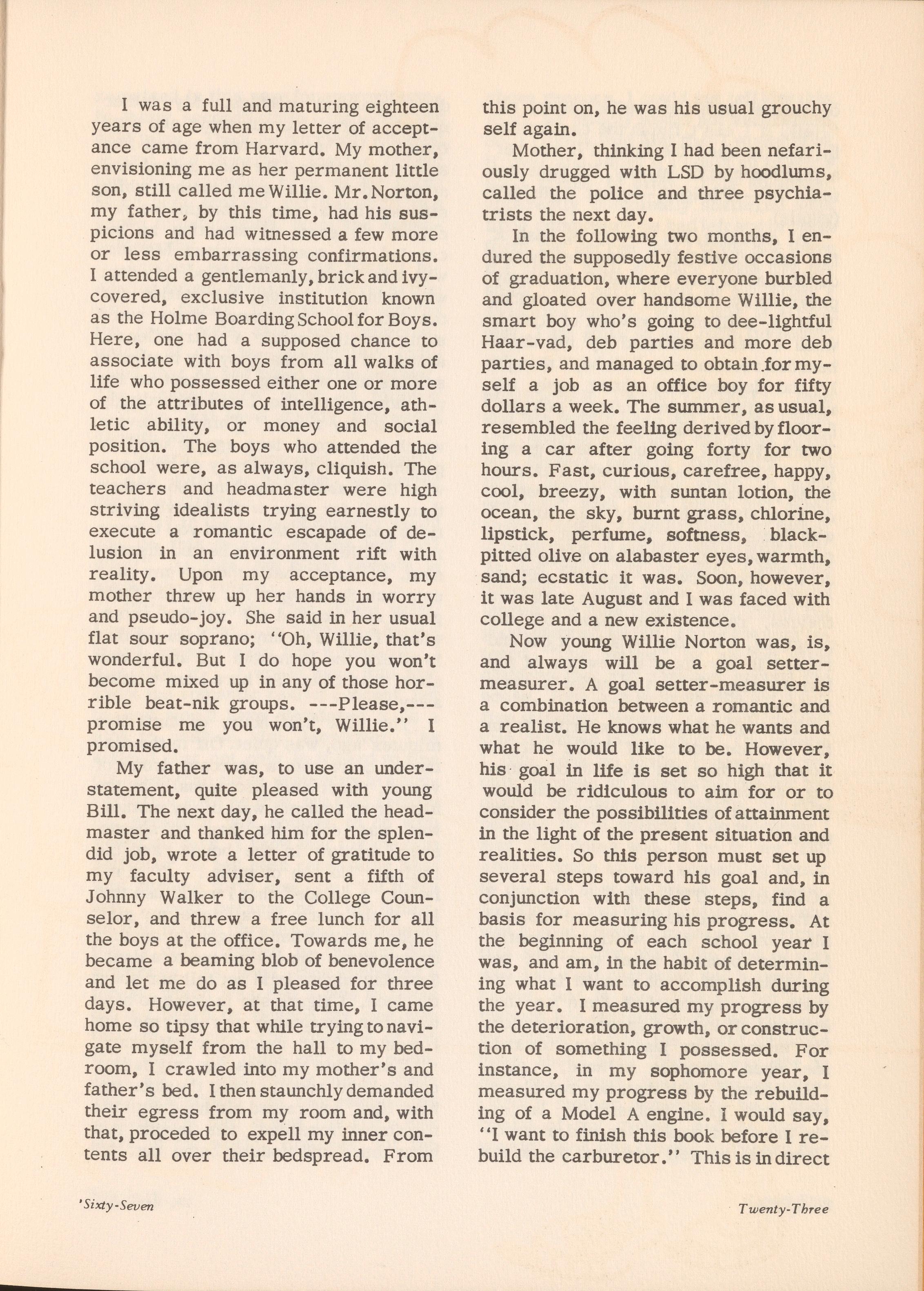
this point on, he was his usual grouchy self again.
Mother, thinking I had been nefariously drugged with LSD by hoodlums, called the police and three psychiatrists the next day.
In the following two months, I endured the supposedly festive occasions of graduation, where everyone burbled and gloated over handsome Willie, the smart boy who's going to dee-lightful Haar-vad, deb parties and more deb parties, and managed to obtain.formyself a job as an office boy for fifty dollars a week. The summer, as usual, resembled the feeling derived by flooring a car after going forty for two hours. Fast, curious, carefree, happy, cool, breezy, with suntan lotion, the ocean, the sky, burnt grass, chlorine, lipstick, perfume, softness, blackpitted olive on alabaster eyes, warmth, sand; ecstatic it was. Soon, however, it was late August and I was faced with college and a new existence.
Now young Willie Norton was, is, and always will be a goal settermeasurer. A goal setter-measurer is a combination between a romantic and a realist. He knows what he wants and what he would like to be. However, his · goal in life is set so high that it would be ridiculous to aim for or to consider the possibilities of attainment in the light of the present situation and realities. So this person must set up several steps toward his goal and, in conjunction with these steps, find a basis for measuring his progress. At the beginning of each school year I was, and am, in the habit of determining what I want to accomplish during the year. I measured my progress by the deterioration, growth, or construction of something I possessed. For instance, in my sophomore year, I measured my progress by the rebuilding of a Model A engine. I would say, ''I want to finish this book before I rebuild the carburetor.'' This is in direct Twenty-Three

opposition with the realist theory of, "Hell, if I can't finish the carburetor in time to read the book, I'll just get a plot summary. Anyway, I'll pass the test. ----Pledge,----what pledge? (giggle).''
At any rate, the on-coming rush of fall and school left me completely undecided as to what I should measure my progress by. I simply could not decide. That is, until my first week of school, when I was confronted by my three bearded roommates. "Ah ha," thought I, and immediately threw away my razor, after shave lotion, cologne, beard softener, ; foamy, and blades. By Thanksgiving, 1·had succeeded in growing a hardy two-inch bush. Unfortunately, I was faced with the prospect of returning home. By this time, I was quite fond of the forest on my face. However, I was becoming concerned about how my parents and the "girl back home" would take it. Nevertheless, rather than shave off my progress, I decided to stick it out and record in my diary the events of my homecoming. Thus, the author's intent is revealed.
The following are excerpts from the precious diary of Willie Norton. Hopefully, they will prove to be amusing, although, to use a trite phrase, the events did seem ''funny at the time."
NOVEMBER TWENTIETH: Today I arrived at the station, where good old Mom and Dad were waiting diligently. My car passed them; they did not recognize me. I descended from the train and approached them as they squinted off into the opposite direction. My mother was just turning towards me when, suitcase in hand, I said, "Hi, Mom." With that, her two bloodshot orbs grew fantastically larger, she drew in a small gasp, and proceeded to fold herself down and out on the T
dirty rounded cobbles. My father merely stared incredulously and continued to do so for what seemed like several minutes. He then gulped and attempted to pick up my mother while still staring at me. I imagine we received all sorts of attention as we carried my semi-conscious· Mother, who was moaning, "Oh, God! My son; why mine?" through the station and out into the car, where there were some smelling salts. A sultry silence, shattered occasionally by my mother's sniffles and weeping, was kept on the way home. At home, I was accordingly "sent to my room." This is a device which I learned long ago is used by parents when they simply do not know what to do about something. So, rather than stall for time with evasive questions and banter, they send you to your room while they have a heated discussion. At least, that's the way my parents act. So, being civil, I played their game and skipped off to my room, where I had to go anyway, because that is where the bathroom is, and it was about that time. So here I am writing away •••
The past half hour, up until five minutes ago, was quiet. Off in the distance, there was a staccato drone of voices, punctuated occasionally by the high sour soprano wail of my mother, who was doing her best to shatter every window in the house, and the raging, "No son of mine ••• " of my father. I decided that I would use this lull in the storm to call Jane, my girl. I didn't know when I might get another opportunity. She invited me to a dance Saturday night. I did not tell her about my face. I figure she is going to have to either accept me or reject me, but I would rather catch her off guard. Then, five minutes ago, my father · entered the room, closed the door behind him, and raised his hand with his forefinger extended. His mouth just hung there and nothing came out. He
remained in this pose for approximately thirty seconds while I inspected his gold inlay. Then, he hurriedlywheeied around and departed, leaving behind him the deafening bang of the door. More high soprano and forceful tones arose intermittently from the household depths.
Another half hour has passed including fifteen minutes of conversation with my father. This time, he entered the room quite calm and collected, which, of course, immediately indicated that he had taken a tranquilizer. The conversation went as follows:
''Son, you have greatly distressed us with your ..• "
''Beard,'' I suggested innocently.
And with that impetus, he started his usual tirade.
''Why in the name of decency would you do this to your mother and me? Why?" At this, the blood vessels in his forehead bulged.
"It's just hair, Dad. Good grief 1 I mean, so what. Just because I have a beard doesn't mean I'm a beat-nik. I just like it." I would have told him about the romantic realist concept, but he just would have dismissed it as a plot to confuse him. Moreover, I've noticed that not only is it hard to fire off more than three sentences in a conversation such as this, but that usually my presence has nothing to do with what Dad says. I know that for the past half-hour he had been rehearsing what was gushing forth now. So I sat there and, I guess because he is my father, let him bounce phrases and maxims off me. I only listened to the last five sentences. As usual, they contained a threat, which was that I was to shave off my beard or finance my own way through college. The injustice of the thing made me quite angry. I mean, after all, he was asking me to shave away something that represented my introduction into a new life and a new start in the world. However, for the
above reasons, I could not tell him this. Also, he simply would not understand. So, I calmly told him that I would think it over and asked if I could go to see a good friend of mine. This statement apparently completely shattered what little composure he had left and brought forth the decree that I could not leave the house until my face shone like. the shiny peak surrounded by my father's dwindling forest. Well, this is all for now. I am going to see John,mybuddy.
John and his family have not changed much. Mr. Spagliano is still the same rough but lovable cement contractor, and Mrs. Spagliano still tries to spoil everyone with her pizza and other savory items. I think my mother rather disapproves of my friendship with John. At any rate, my greeting there was · different. First, there were the same stares, but then· laughter and rough but good-natured joking. I have been christened "The Beard" by all the little children that run rampant around the house. John was in hysterics for a full five minutes. He was, as usual, the tall thin diamond in the rough. The reason I like John so much, I guess, is not only because he accepts people for the quality of their inner works, but also because he is willing to do whatever I feel like doing and, if he is not, can always come up with something better to do. We shot the breeze for a while, had dinner, and then I called a girl who was a good friend. I'm sure I've written this before, but she's the. type of girl who has real character and a sense of humor, and is good-looking, but goes through life skipping from one romance to another while the world crashes down about her. That is why she is only my friend. She invited us over. Carol's mother happens to be a good friend of my mother and is also a gossip, so I was careful to record her

'Sixty-Seven
Twenty-Five

reaction. At first there was the stare, and then, I'm sure, an inner delight, for she began giving me the giggly "how cute" lin e which made her about as attractive as the emaciated fish she so well resembles. As she spooned forth frivilous prattle, I could picture her on the phone saying, ''Miriam, you'll never guess what I've got to tell you." I soon excused myself. We just sat around and talked with Carol until about twelve. She was quite distressed because a certain teacher, renowned for her favoritism and cruelty, was giving her "the works" at school. John and I decided to fix a certain teacher that night.
As soon as we left Carol's house, we rushed to John's and picked up his famed Super-Duper-Poop-Scooper, which is a device for removing dog droppings from unwanted spots. Equipped with this, a shopping bag, and a flashlight, we set off on a midnight hunt, which ended when we came upon a cow pasture about four miles from our destination. Ten minutes later we were on the doorstep of a certain beloved teacher, setting fire to a shopping bag full of manure, while the pin in the doorbell did its work. We remained in the vicinity long enough to _ hear the appropriate squosh and shriek as beloved teacher tried to stamp out nasty fire. Then, we ran to our car a block away.
I spent the night at John's, and, by the time I came home, my mother had received three phone calls of condolences about poor disillusioned Willy. (Ha, ha, our son's turning out better than yours). Needless to say, she was in bed and being attended by the physician, who is a good joe and apparently had a hard time keeping a straight face while listening to mother, for he grinned profusely when he confronted me in the hall and said, ''Nothing wrong with her that a good shave won't fix." My father was a bit calmer,
primarily because Mom was temporarily out-of-order. I was actually able to exist peacefully for the time I was there, which was not long. He didn't speak to me. I remember that when I tried something like that when I was a kid, all hell broke loose.
NOVEMBER TWENTY-SECOND: Well, it's two o'clock and I am home and quite happy with myself. But, it was not all that simple. When I picked Jane up, she first stared, and blushed from the roots of her hair to the toes of her feet. It was a very interesting process to watch as she had on a low cut dress. At any rate, it was obvious that she was mortified, but she tried not to show it and affected an unassuming air, which did not quite go over. Her mother was mumbling her greetings as she turned the corner leading into the hall, and upon seeing me, gasped so openly that a great crack appeared in the extensive make-up on her left jowl. After this display, she just stood there opening and closing her mouth while emitting strange half gasps and stutters. I ushered Jane out as fast as I could. I was afraid the shock would wear off.
At the dance, I spent most of my time talking to old, surprised friends. They acted quite friendly, but I could not help feeling that my beard somewhat stifled conversation. I mean, a person would be talking quite freely while all the time glancing nervously at my face. Jane, upon our arrival, had gone to the girls' room to cry along with the other girls whose dates had become roaringly drunk at the preceding dinner party. At twelve-thirty she emerged and promptly demanded to be taken home. By this time, everyone had become convinced that I was still the same person, plus beard, and I think Jane felt this, for she agreed to stay for the remaining half hour of the
The Messenge r
dance. On the way home, I parked and for two hours, explained to her the whole reason for my face, my greetings since arriving, and what I would think of her if she acted as others had. Thank God, she was quite understanding, and at the door even told me she sort of like it (even though it tickled). At any rate, I feel much better now and I'm starting to consider humorous some of the things that have happened lately.
NOVEMBER TWENTY-FOURTH: Nothing much has gone on in the last couple of days, with one exception. Today, around twelve-thirty, I began to wonder what would happen at the archaic Holme Boarding School if last year's vicepresident of the school, member of the student council, and varsity letterwinner in two sports showed up sporting a two-inch beard. I sat there for about an hour thinking on the subject until the idea appealed to me so much that I just had to try it. So, I called John and told him the idea, which he liked, and he said he would pick me up in half an hour. A little while later we arrived at the school grounds, where a group of students immediately saw me. Needless to say, they thought my face was just the thing to ''fix'' some teachers, among whom one or two outlawed wrap-around dancing at a school dance because it was "practically illegal necking." As I approached the entrance, I . could easily imagine the spasms of joy that were passing from one class room to another. Unfortunately, I arrived just as lunch was over. This is the time when the elder teachers gather and tell their rather droll jokes, the young teachers get together and tell their not-so-droll jokes, and the students seek out their appropriate clique. As I walked in, a group of the older teachers spotted me. At once they emitted in unison a horrified shout, and, along with the just arriving head-
'Sixty-Seven

master, rushed upon us and ·ejected us bodily from the school. John and I arose laughing, and let the institution grind away at its usual speed to turn out "fine young gentlemen." It does not like to be reminded of its failures.
NOVEMBER TWENTY-SIXTH: Today, despite my mother's violent protests, I attended a family reunion. Here everyone greeted me with a cold candor, and I could find no one to talk with except Uncle James, who, as usual, was so far gone that he did not notice any change in me. Anyway, I am going back to college in a few days and certainly will be glad to get back to a place that is less chocked-full of disapproving faces. There is not much thanks-giving around this berg.
Thus end my excerpts. · At the beginning of my sophomore year, I cut off my beard, not because I could not stand what others thought, but because I had accomplished all I had wanted to · in my first year at Harvard. Things progressed at home, too. Mrs. Norton does not address her son as "Willie" any more, but with a cold and frigid "William'' and, when she thinks I am not looking, she stares at me in quite a puzzled manner. The boys at the office have been wondering at my father's silence and negative replies to the progress of ''young Bill." And my old instructors and -headmaster have long ago shut me out of their mind, although I am sure they would remember me now. My relatives ask nomote questions and make no more inspired comments. Jane's parents are still in shock. Carol's mother has not been so happy in years. So, I am left with the start of another school year and must make a decision about what to measure my progress by. I decided yesterday that it ought to be measured by the gradual return of the compatibility of my home environment.
Twenty-Seven
Crunch. Walking on snow. The silent night awakens. Laughter from a group.
Pretty face upturned . ..
Why so very cruel, oh world? Only one eye to behold.
Winter winds--cut, cold. How do you make someone care? When bitter tongue speaks.
Flies buzzing, hot air. Walk Via de la Rosa. The world is the same.
Red, hot, fiery ball. Around the world you travel. Again, beautiful.
Flower, what is lov_e? A physical attraction Or heaven's sanction ?
- Martha Dorman
How could you dare it, Spoiling my tryst in the woods, Oh, unfeeling rain?
Nervous, vibrating, Quivering stalks of desireThese reeds in the pool.
- Cathie Angle

Twenty-Eight
Trustingly you came But I was not yet ready For your love only.
Oh paths divided To the right and to the leftWhich one shall I take ?
- Joan Bendall
Crimson leaves drifting Aimlessly on unmarked paths, Lost from mother tree.
Bushy gray plumes wave, Flirtatiously enticing, As two. squirrels meet.
Why must you die now? Your beauty has won my heart, White Chrysanthemum.
Gold grows on our trees, Its weight bending the limbs low Till ripened pears fall.
- Connie Moore
Strong hand holding mine, Gentle voice comforting me, Father understands.
- Kathleen Clinedinst The Messenger

The gun cracks and coughs
Small smoke to the wind. In a silent explosion, With muscles bulging And face strained and stretched, He blasts over ground, Hardly touching Yet spitting dirt from his feet. For a moment motionless, As if captured from time, He collapses expended. The severed string lies limp.
- James Bowen
The University of Richmond, situated among its rolling hills and tall pines, is in virtual isolation from the rest of the city. Its quiet, secluded location insulates it from the noise and activity of the surrounding area and, to a certain extent, from contemporary ideas and attitudes.
Listed in the catalogue, some purposes of the institution are '' • . • to provide ••• in a Christian atmosphere'' an academic program to develop ' ' .•• intellectual, spiritual, social, and physical potentialities," to "equip students .•. to think and act rationally in our complex society,'' while defending "freedom of discussion", and develoi;,ing ''individual freedom without po,-

litical pressures and control." While these purposes are stated clearly, the University has not generally followed them. Perhaps when these purposes were written the rules governing the activities of the students were in keeping with the contemporary standards of society. But times have changed and the University must change with them. Individual freedom extends beyond the doors of the classroom, although the University has only partially recognized this. It feels .compelled to act as a guardian for its students and to impose its own moral code upon them. It seems to feel that students are sent to college to be told what their ethical values should be. Such a policy ab-
sorbs much energy that could be better spent in advancing the true purpose of a university -to educate its students.
That there should be an atmosphere conducive to "high" personal .morals is not in question; the imposing of restrictions to further this end is.
No one is advocating complete moral license on the University campus. Such a policy would be disastrous. What most students and many faculty members are advocating is the right of students to choose their own ethical values. The University Administration should not be shocked at or ignore a proposal to allow drinking at fraternity parties on campus. Such a policy is in effect in many state and out-of-state schools and is accepted by society. The fact that this school is supported partially by Southern Baptists who disapprove of drinking should have no bearing on the matter. Do Baptists have the right to deny Episcopalians, Catholics, Jews, or anyone else who is not morally opposed, the right to drink at a fraternity party? Does he who pays only part of the Piper's salary get to call all of the tunes?
If destructive or malicious activities resulted from such a policy, then punitive measures should result. But this is highly unlikely. Randolph-Macon College (supported by Methodists whose position on drinking closely parallels that of the Baptists) allows drinking at parties and manages to grow and retain a good reputation.
Another freedom which University
'Sixty-Seven

by Bill Owens
students are denied is the right to ''goof-off" and accept the consequences --failing. Required attendance at over · 90% of class meetings is an understandable policy and one instituted for the benefit of the student. But one of the processes of growingupandmaturing is deciding when one must do something or accept the consequences. Many classes are taught strictly from the text and class attendance is useless. Students should be given the opportunity to exercise their judgment in which classes are necessary to attend and which may be missed for independent study.
The University has many more problems; some very poor quality housing, discouragement of entrance to members of certain ethnic groups, · etc., but many of these can be blamed on the lack of effective student leadership. Many problems could be solved H students would try to get the administration to accept 1 or at least listen to, their ideas.
The University of Richmond has its problems and it is beginning to solve them. But the progress is too slow. To grow and prosper, the University must shed its provincialism and listen to new ideas. ' Liberalism" is not necessarily dirty, nor is federal money. New ideas are not to be scorned and student opinion is not to be laughed at. If the University continues its present course, however, it will be.
Thirty-One
